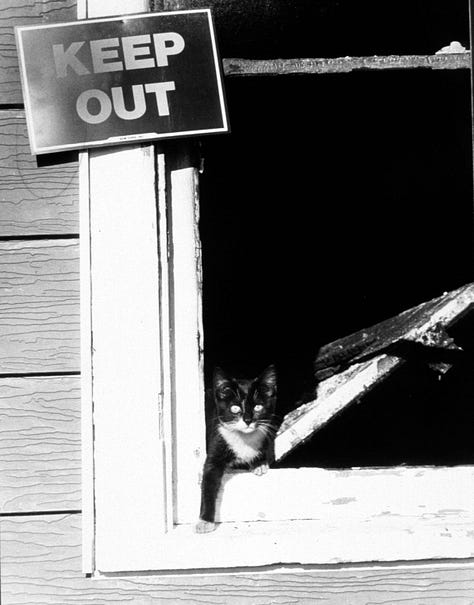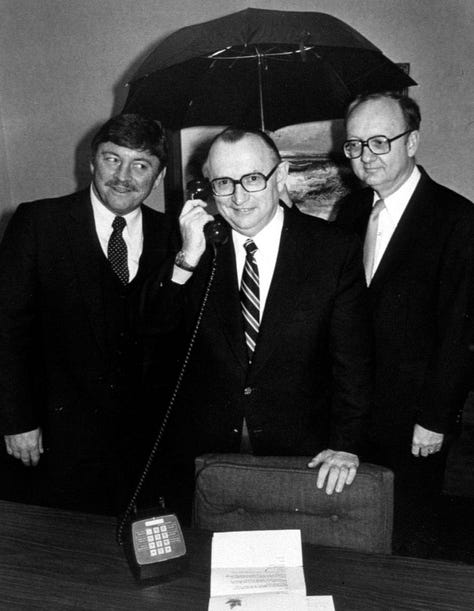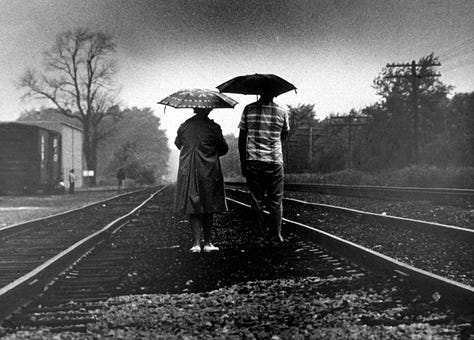The Slop School of Internet Success and other lies about cyberspace
A two-year retrospective
Two years ago, I started Experimental History.
One year ago, I thought, “Maybe I could do this for a living.”
Today, I can. Pretty wild!
I predicted pretty much none of the things that happened over the past two years, so it’s a good time to look back and think about the two biggest things I got wrong.
HOT IRS SINGLES STANDING BY
First, I was wrong about what succeeds on the internet.
A lot of people believe that making a living in cyberspace means figuring out what kind of slop people are looking for, mass producing it, and then fooling people into eating your slop instead of someone else’s. Call it the Slop School of Internet Success.
Common forms of slop include:
lukewarm takes (“President Biden Should Do Good Things Instead of Bad Things”)
outrage porn (“Can You Believe this Billionaire Held a Party where He Sunk a Bus Full of Capybaras Into a Swamp??”)
self-help mumbo jumbo (“How to Influence Other People By Standing Way Too Close to Them Until They Do What You Want”)
celebrity fixation (“Taylor Swift Has Never Read the Qur’an, But Here’s What She Might Think Of It If She Did”)
irrational science exuberance (“This Study In Which a Mouse Lived an Extra Four Minutes May Hold the Key to Human Immortality”)
obsessive news analysis (“How Local Wind Speed May Affect Trump's Trial”)
outright scams (“Owe the IRS Back Taxes? Marry and IRS Agent and You’re Immune From Prosecution! HOT IRS SINGLES STANDING BY”)
anxiety not otherwise specified (“30 Bad Things That Haven’t Happened Yet, But Could, Assuming Infinite Time and Universes”)
and general clickbait (“Last Night I Had A Vision From the Archangel Gabriel and He Told Me How You Will Die, Click to Find Out”)
I wish I could say that I never believed in the Slop School. I set out aspiring to make something better than slop not because I thought slop was an ineffective business model, but because it seemed way more fun to polish ideas until they shine, throwing most of them away in the process. I thought maybe I could eke out a little niche in an otherwise hostile ocean, like a bacterium clinging to a deep-sea hydrothermal vent.
I now know the Slop School has it wrong. Yes, you can make a living selling slop, just like you can make a living stealing identities or cold calling people about car insurance. But it’s actually the hardest way to succeed on the internet. You have to compete with all the veteran Slopmongers who are already vying to capture to the lowest common denominator, and you have to keep updating your scams as people catch wise. Your work amounts to nothing other than dollars in a bank account (if you’re lucky!), and people hate you for it.
I set sail on the sea of slop every day, and not only does the good stuff float—it shines. Pocket, the app I use to read articles on my phone, informs me that I read 946,000 words last year, or the equivalent of 13 novels. I am desperate for good content. When I read something mediocre, which is most of the time, I shrug and move on to the next thing. Whenever I find someone being honest, original, and interesting, I go “YES!” and I hit the little star icon in Pocket so I can find it again and I usually end up linking to it. If I’m lucky, that person is on Substack, so I can subscribe and get the rest of their stuff.
I know other people feel this way, because whenever I find what seems to be a hidden gem on the internet, it suddenly appears everywhere. The most recent example is this terrific book review of The Education of Cyrus, which my friend Ethan Ludwin-Peery sent me mere days before Astral Codex Ten, the largest science Substack, also linked to it. The internet can be fickle, yes, but the best way to tame it is to keep making good things that people want to share with their friends. Assuming that everybody wants a slop-filled internet is like assuming everybody in a traffic jam want to be crawling along the highway at five miles per hour.
(See also Henrik Karlsson’s When I have a slower publishing cadence my blog grows faster.)
HOW TO ENTER A BOX AND DIE
The Slop School of Internet Success is based on two pervasive lies. First: that it’s easier to operate in bad faith than good faith, more effective to treat every human as an adversary rather than an ally, more satisfying to dupe someone than to delight them.
(Why is this ideology so appealing? Maybe it’s because we assume that, when someone takes advantage of us, their joy must equal our pain, as if happiness is zero-sum. Or maybe it’s because we think forbidden things must be more valuable; why else would they be forbidden?)
The second lie: success comes from contorting yourself to other people’s desires. In this view, there are like 35 things society will allow you to be, and if your naturally-occurring preferences just happen to lie far from any one of them, too bad, buddy! You better find the closest box and shoehorn yourself into it, or else you’ll suffer and die. Following this ideology is a good way to end up suffering and dying, just inside a box.
(See also: Excuse me but why are you eating so many frogs.)
People told me both of these lies when I was starting out, I didn’t follow them, and I'm still standing. It's been hard, sure, but in a good way rather than a dumb way. What I wrote a year ago has only become more true:
When I’m writing this blog, I feel like that scene in Indiana Jones and the Raiders of the Lost Ark where Harrison Ford sticks the Staff of Ra into an underground map at the right time of day and a beam of light shines through the ruby at the head of the staff and it reveals the final resting place of the Ark of the Covenant. Which is to say, I feel like I’m in alignment with the universe, channelling sunlight, illuminating something that used to be unknown.
BEEP BEEP GOES THE MAZDA
My second mistake was not realizing: if you like something and want more of it, give it money, and you’ll get more of it.
I came of age in the Napster days, when only fools spent money on anything digital. Early on, we decided that we’d rather pay for the internet with attention instead of money. This seemed like a good idea at the time, and at first, it was!
It was like having a big party sponsored by Mazda, and all that meant was having the Mazda logo on the Solo cups. Then it meant sitting through a 5-minute Mazda presentation before having fun. “Mazdas are good cars!” the Mazda man bellows at you. You try to crane your neck around him—will this party have cheese?, you’re wondering—but he’s too big. The walls are covered in Mazda logos. The Mazda man is shouting about Bongo Brawnies. You realize the party is happening in a place that is less of a “room” and more of a “Mazda.” On the seat next to you there’s a plate of Mazda-shaped cupcakes, and you reach out to grab one, but you can’t, because you don’t have hands. You are a Mazda CX-3, a sensible crossover SUV that can fit the whole family for a weekend of fun.
Which is to say, we didn’t realize that “paying with our attention” meant “paying by having a worse time.” Now we go through endless cycles of “enshittification,” where every good thing on the internet starts dying as soon as you find it.
The internet didn’t create this problem; it just gave that problem a place to metastasize. Our original sin was believing there are only two ways to spend money: transactions and benefactions. That is, you part with your dollars either out of obligation or pity. I only pay rent to the conglomerate that owns my apartment because I have to; I give money to GiveWell because I think it’s a nice thing to do.
Neither transactions nor benefactions feel quite right. I have no love for the conglomerate that owns my apartment, and if I could pay them less money without being evicted, I would. Giving to charity is important and kind, but ideally, we wouldn't have to spend money to fix the problems we cause by the other money we spend. (“So sorry that the global economic regime means you’ll always be way poorer than me, please accept this goat as thanks.”)
There’s a better template for economic activity between humans, which is spending money in the way that, in the long run, makes the world more like how you want it. This is an old idea, but also one that we have to keep reinventing because we also keep inventing ways not to do it. I don’t know how to accomplish that with, say, real estate, but it’s pretty clear how to do this on the internet, and it’s something like Substack.
For instance, I give Julian Gough money because I like that he’s working on wacko ideas about the universe that maybe aren't so wacko after all. I don’t want anything from him except for him to keep going. Until we get a Science House, this is the best way to support a weirder scientific ecosystem. I pay Aella, the sex-worker-cum-data-scientist, and Sasha Chapin, the good insights guy, for similar reasons.
Is what I get from these folks “worth” what I pay them? It’s the wrong question. I’m neither their customer nor their sugar daddy. I'm their...I’m not sure we even have the right word for it. Ally? Colleague? “Patron” is too grandiose and status-laden; I’m not a king and they aren’t my servants. I just like that they exist and so I’m happy to help enable their existence. I’m better off for it, and so are they, are so are the people who get to read their stuff but can’t afford to pay.
I know other people are way ahead of me, but I’m trying to make more of my spending like this. I paid Erin Mabee, a graphic designer, to make an Experimental History t-shirt (which I then gave away to subscribers), and I paid Brandon Rosiar, a musician, to make the theme music I now use for the voiceovers. Those transactions weren’t ransom or charity. It’s actually a pleasure to pay someone you respect to do work that you appreciate. That’s the same relationship I strive to have with the folks who support Experimental History—to make us both better off by doing what I’m good at.
This is a better way to make the internet party happen. There’s no such thing as free booze, so I’m happy to bring a six pack. Everybody’s welcome to have some of mine, especially if they can’t afford to bring their own. The people who are good at playlists do the music, the people who are good at moving their bodies get the dance floor going, the people who are good at conversations give you something to do when you’re sweaty and want to sit down. If everybody contributes however they can, the party never has to stop. The only rule is no Mazdas.
TOP POSTS FROM THE PAST YEAR
So that’s what I learned. Here’s some of the stuff I wrote, specifically the top five most-viewed posts:
There are plenty of professional science complainers on the internet, and I don’t like joining them too often. But if you’re going to be a canny consumer or producer of science, you have to realize that most papers don’t matter. And then you have to dry your tears and start wondering: what would it take to make things better?
See also Paul Bloom’s response, my response to his response, and Ethan Ludwin-Peery’s response to his response.
A lot of journalists emailed me about this paper, and whenever they did, I would send them a link to the blog version. Most of the time, they would reply, “Oh, actually that answered most of my questions!” Which is wild, because the blog version has way less information than the journal version. And the journal version is pretty much as readable as scientific articles get—my coauthor Dan is a savant at science-speak, and he and I spent months sweating over the prose.
All of this reconfirms for me that the journal article is engineered to be the worst way of transmitting scientific knowledge. It has way too much information for the 99.9% of people who only need the gist, and way too little for the .1% who want to build on it. Oh, and this paper cost us $12,000 to make it open access! Otherwise it would cost you $200 to read it! Do you see why I don’t do this anymore? If you’re serious about finding stuff out and telling people about it in a useful way, you won't do it in a journal.
One of the promises I made in this post was to respond to any serious email asking for help on a scientific project. So far, this is the advice I’ve given most often:
Just do it
Write it up in normal words
Put it on the internet
If you do those things and you don’t lie, you’re easily in the top 25% of research. (And if you send it to me I might link to it.)
If you’ve emailed me about a scientific project and I haven't replied yet, please email me again; I’ve lost track of it. If you're not in the Discord yet but would like to be, you can email me at experimentalhistory@substack.com and explain what you’re up to.
Probably the single most important lesson from the history of science is that progress happens not when serious people wisely figure out what to do next, but when weirdos screw around.
This is perhaps the most important thing I wrote last year, and the most misunderstood, which is on me. Clearing things up will probably take another post entirely. For now, you can read this nice followup by Maxwell Tabarrok.
THIS YEAR IN MYSTERY POSTS
In 2023, I started writing occasional MYSTERY POSTS as a way of saying thanks to paid subscribers. Here are a few of my favorites:
And the “death in Oxford” diptych:
THE YEAR TO COME
So, what’s next for Experimental History?
I have no idea. So far, every post has come like a demonic possession: an idea squats in my head and will only leave if I can say the right words in the right order. I’m going to continue doing that.
In the meantime though, I’m going to keep trying to make art instead of slop. I’m gonna keep the party going. And above all, I will not become a Mazda.










I've been really excited to see you find support to do your thing without compromising. I unpaywalled the post you linked in case someone wants to see the full statistics on why I conclude that doing high integrity effort posts is a good strategy: https://www.henrikkarlsson.xyz/p/effort-pieces
This post is a good read. I'm torn though on the giving money to things you like, because it seems like so much asks for my money straight up, and I'm the sole earner for my household. Subscription creep, can eat through a lot of dough quickly.
On the other hand I want the things I like to keep doing what I like them doing. I'm reminded that Dave Grohl made a lot of his money before the internet with Nirvana because people actually bought records.
On the other other hand though I don't like that people can coast off of work from years and years ago. I'm not a big fan of the crazy length copyright lasts and I want good ideas to spread. Sometimes all I can give is engagement and I hope that other authors can engage with me.
Anyway, loved the post and I hope you keep up the good work.